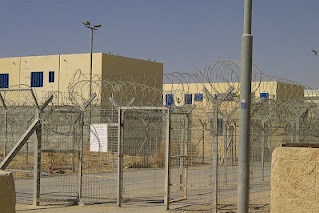 Saharonim Detention Center
Saharonim Detention CenterThe state will be required to defend the legality of a number of sections of the anti-infiltration law, following a hearing this morning at the High Court of Justice.
Supreme Court President Asher Grunis announced that the panel of three justices, which he headed, will issue an order nisi – an order that the government must explain why the amendment to the Law to Prevent Infiltration should remain in effect. The state has until April 30 to respond. The panel of judges also included Deputy President Miriam Naor and Justice Edna Arbel.
The hearing took place in a courtroom filled to capacity, in the presence of five asylum-seekers from Eritrea and Sudan currently incarcerated in the ‘Saharonim’ detention center in southern Israel.
The amendment to the Law to Prevent Infiltration, which went into effect almost a year ago, permits the detention of asylum-seekers that have entered Israel through the Sinai Peninsula for a period of at least three years without a trial. Approximately 2,000 people who entered the country over the last few months are currently being detained under the law, including dozens of children. The vast majority of the detainees are Eritrean and Sudanese citizens – countries whose citizens, according to the government’s own directives, cannot be deported due to the threat to their lives.
The petition claims that both Israeli and international law prohibits the detention of immigrants if it is not for the purpose of deporting them. It further adds that the detention of asylum-seekers fleeing for their lives, who suffered through torture camps in Sinai, is likely to substantially aggravate the harm done to their health and welfare. Moreover, it makes clear that deterring new immigrants from traveling to Israel cannot be a sufficient justification for the detention of past immigrants.
In a response submitted prior to the hearing, the state admitted that so far more than half of the inmates have submitted applications for asylum. Despite this, and though the applications have not yet been examined, the state continues to claim that they are not real refugees. The state’s response also acknowledged that returning migrants to Eritrea may put them in danger. Regarding Sudan, where hundreds of thousands of people have been massacred over the last decade, and whose leader is wanted by the International Criminal Court in the Hague to face charges of genocide and crimes against humanity, the state merely claimed that they are facing bureaucratic difficulties in repatriating asylum-seekers seeing as Israel has no diplomatic relationship with the country.
According to Attorney Yonatan Berman of the Clinic for Migrants’ Rights at the Academic Center of Law and Business: “the Law to Prevent Infiltration is one of the most extreme laws ever enacted in Israel. It torments innocent people, including women and children, refugees and victims of torture, whose only crime is attempting to flee for their lives. This is a stain on our law books, and we have a legal and moral obligation to invalidate it.”
The petition to invalidate the amended law was submitted in October 2012 by
- Attorney Yonatan Berman of the Clinic for Migrants’ Rights at the Academic Center of Law and Business in Ramat Gan,
- Attorney Anat Ben Dor of the Refugee Rights Clinic at the Tel Aviv University Faculty of Law,
- Attorney Oded Feller of the Association for Civil Rights in Israel (ACRI), and
- Attorney Asaf Weitzen of the Hotline for Migrant Workers.
ASSAF – Aid Organization for Refugees and Asylum Seekers in Israel, The African Refugee Development Center (ADRC), and Kav La’Oved are also named as petitioners.
Additional Materials
For excerpts of the petition (in English), click here.
To read a copy of the petition (in Hebrew), click here.







